| Reviews & Columns |
|
Reviews DVD TV on DVD Blu-ray 4K UHD International DVDs In Theaters Reviews by Studio Video Games Features Collector Series DVDs Easter Egg Database Interviews DVD Talk Radio Feature Articles Columns Anime Talk DVD Savant Horror DVDs The M.O.D. Squad Art House HD Talk Silent DVD
|
DVD Talk Forum |
|
|
| Resources |
|
DVD Price Search Customer Service #'s RCE Info Links |
|
Columns
|
|
|
Streetcar Named Desire, A
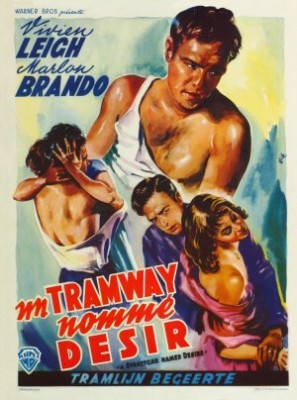
Elia Kazan's A Streetcar Named Desire took Tennessee Williams's already successful, acclaimed stage play and made it a phenomenon, a permanent part of cinema history. For one thing, it brought Marlon Brando to the silver-screen spotlight for the very first time; it is his persona here, not the arguably better and more important work he did in The Godfather years later, that made the image of Brando that is indelibly branded into our minds for all time. The film pushed the envelope, too, and courting sensation and setting a new standard for drawing controversy and acclaim; it was also showered with Oscars and theatrically re-released to great success several times over the years. We now have a 60th-anniversary commemoration of Streetcar in the form of a very well made and put together new Blu-ray edition, a worthy talisman to remind us that its frenzied, near-physical emotional power and panting, palpable sensuality have easily survived, with all the ensuing relaxations of censorship and shifting of moviegoers' tastes toward less heightened, fraught displays of emotion failing to make it feel any tamer or more old-fashioned. The ease with which the film has borne six decades' worth of the march of time -- through which it has kept a firm hold on its intoxicating allure to remain as seductive as ever -- might even have given some comfort to its female protagonist, so famously horrified, obsessed, and driven paranoid over the idea of ageing.
That most sensitive point in the fragile psyche of delicate, vulnerable Blanche DuBois (Vivien Leigh), like all the other ins and outs of Williams's story and characters, is by now such a deeply embedded part of any shared cultural memory we have that one is expected to be familiar with it to even fully appreciate certain Simpsons episodes. Blanche, the last scion from an aristocratic Southern family that has now completely burnt out, straggles into New Orleans after being forced to sell off the family home, arriving in her sister and brother-in-law's seedy, sweaty quarter. Said sister, Stella (Kim Hunter, A Matter of Life and Death), left Blanche behind in their little Mississippi hometown of Oriole with their dying parents and fading family aura to take up with Stanley Kowalski (Brando), a former-military working stiff whose raw sex appeal has pulled Stella far away from the roots she shared with Blanche (as Stanley reminds her at one point, the process of being taken down off the columns of the venerable, classy old mansion and initiated into more "common," earthier ways of being was one most pleasurable for all involved). Instead of jumping ship like Stella, the formerly first-class Blanche has moved down to lower and lower quarters, her fading fortunes and insatiable need for love transforming her into the town floozy -- the fading spinster that can be had by virtually any man.
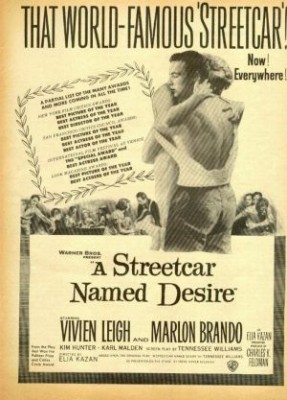
Practically the whole of the film's entire two hours of drama rests on the disconnect between Blanche's image of herself as a graceful, virginal Southern princess just ripe for the marrying and her actual state of being as a woman with the same needs Stella has so heedlessly gotten met by the animal Stanley; those contradictions are thrown into relief by Blanche's much-too-close proximity, in the tiny two-room apartment they all share, to the now pregnant Stella and her husband, who seems always to be in some state of swaggering, slickly perspired half-undress. Blanche, a classic victim of the unjust virgin-whore conception of femaleness, tries to play demure potential bride-to-be to Stanley's upstanding, sweet, and sincerely interested friend Mitch (Karl Malden), but neither her overpowering need to feel desirable nor the past in which that need has come to hold sway can be escaped with a mere move to New Orleans. Despite Blanche's best efforts, she seems bound to be pulled down by Stanley's irresistible force into the purely-physical, animalistic muck she's simultaneously fascinated and repelled by -- a defeat experienced as much more rending for her ultimately naive, innocent, defenseless soul than it was for Stella, who watches helplessly as her sister, dragged inexorably along by Stanley's blind driving impulse to rip away all veils (beauty, grace, poetry, glamor, romance) and take everything down a peg, descends into madness.
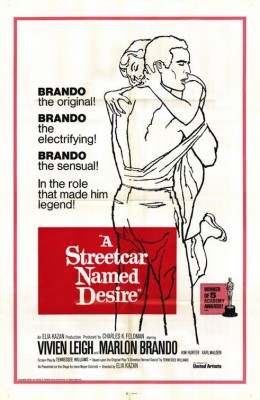
Kazan and cinematographer Harry Stradling (Suspicion) use masterfully nuanced chiaroscuro lighting, mirror reflections (particularly memorable in the famous rape scene that had to be shorthanded for the censors but still comes off as literally shattering through director's and cameraman's visual inventiveness), and an intuitively sensitive framing of production designer Richard Day's (Young Mr. Lincoln) perfectly rundown, threadbare spaces to highlight the close, humid feel of the neighborhood and apartment sets (all aided and abetted by Alex North's sultry score), gently dancing the proceedings one or two steps away from strict realism into a half nightmare, half wet-dream depiction of squalid urban life resting on a thin veneer that is woefully inadequate to concealing the writhing sexual jungle underneath; even before Blanche arrived, that flimsy layer of rational, self-preserving control had already cracked irreparably under the strain of raw emotion and lust, rent open like one of Stanley's tight, torn, physique-highlighting T-shirts (and by pretty much the same force, metaphorically speaking). In the capable hands of Kazan and his team, the movie's world perfectly externalizes -- actually puts into physical form -- the menacing and alluring psychological and emotional dangers it represents for Blanche, an emotionally exposed refugee from another place and time.
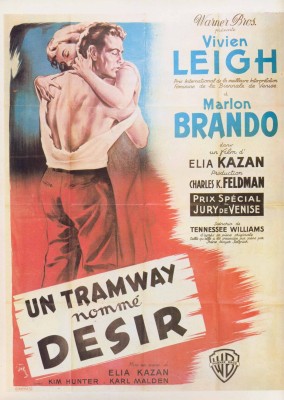
But it is surely the actors that have most immediately struck and awed Streetcar's generations of transfixed (and, probably, aroused to one degree or another) spectators. Brando and Kazan, who began his career as an actor and then a beloved and admired stage director, had had a long history with Stanley Kowalski on Broadway before a film was ever planned, and with his combination of experience, skill, inspiration, and sensitivity, Kazan would seem to be an actor's dream director; he certainly draws performances from everyone that are, across the board, worthy of their legends. Of course there's Brando, who, as his role mandates, makes masculine sex appeal ooze from any frame he's in, dominating every scene and most likely anyone's impression of the film. But the other leads are scintillating, too. Vivien Leigh is florid, desperate, too much, which is perfect for the self-dramatizing, tragically self-deluded, trapped Blanche; and the more solid, earthbound Kim Hunter, in her Oscar-winning "supporting" but absolutely integral role, is fantastic as Stella, whose self-aware, awakened, physicalized femininity just about matches Brando's, and whose pragmatism struggles against the erotic abandon embodied by Stanley with somewhat more (though far from complete) success than Blanche's fanciful idealizations.
A Streetcar Named Desire is centered around a hothouse flower of a character, but it has proven to be a most hardy cinematic specimen (and this Blu-ray release has freed up all of the film's properties wonderfully well, allowing its never-fading freshness to show through more brightly than ever before). It is undoubtedly a "classic" film, but like much of what is so categorized (Shakespeare, Euripides, even the Bible), it has nothing to do with stasis or museum-bound chin-scratching; it's always and forever alive, hot-blooded, intense and immediate. Its story of hopeless innocence violated seems to have eternal appeal, and the passions it depicts don't need to be as explicit as is currently allowed to feel boldly intimate, almost a violation of its characters private longings, lusts, and anguishes. It's as much of an emotional, psychological, and sexual juggernaut 60 years on as it was when it first made the world, like Blanche DuBois, succumb to that sexy cad Marlon Brando -- a love affair that, as this film demonstrates beyond the shadow of any doubt, we never really want to end.
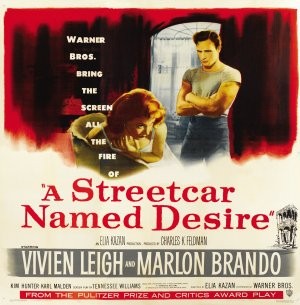
THE BLU-RAY DISC:
The AVC-encoded, 1080/24p-mastered transfer, presented at the theatrical aspect ratio of 1.37:1, is absolutely sterling, impeccable: there isn't even the faintest trace of compression artifacting, and digital noise reduction has been kept well in check to give us an experience alive with the pleasure of fine-grained celluloid texture; you'd swear you were watching frames of celluloid fed through a projector. It's an excellent, unimpeachable transfer job.
Sound:The DTS-HD Master Audio 1.0 soundtrack preserves the film's original mono sound with beautiful, rich, full clarity, without any discernible crackle, hiss, distortion, or imbalance. This is undoubtedly the truest and best Streetcar has ever sounded.
Extras:Most of the excellent, extensive extras have been grandfathered in from the 2006 special-edition DVD release of the film, including:
--A feature audio commentary with film historians Rudy Behlmer and Jeff Young, as well as Karl Malden (who played Mitch onstage and in the film). Behlmer and Young each have some insightful things to say, and both are knowledgeable about the background and history of the film and its making. But I've never been much of a fan of these tag-team commentaries, and that feeling is reinforced here, as each of the historians' different speaking styles and directions seems to dilute the other's and makes for a somewhat distracted, rambling quality. For my money, Malden has the most to say to us, both because he has the presence of a trained, seasoned actor and because he was actually there and has relevant inside stories to tell. Otherwise, this film, as visceral and emotional as it is, and with all its meanings sure to be primally felt by anyone viewing it, is not particularly well-suited to being talked over by experts filling in background and offering interpretation.
--Elia Kazan: A Director's Journey, Richard Schickel's 1994 documentary on the director, is a chronological overview of Kazan's career (focusing more on the personal than the professional, though it does, surprisingly, remark upon the touchy subject of Kazan's notorious name-naming in the McCarthy era) that's straightforward but nicely organized, interesting, and enlightening, with plenty of candid talk from Kazan in the extensive interview Schickel conducted with him for the film.
--A quintet of short documentaries incorporating clips and photos from the film with interviews featuring Kazan, Malden, Hunt, film historian Rudy Behlmer, and critic/Kazan biographer-documentarian Richard Schickel: "Streetcar on Broadway" (20 min.), which documents the phenomenon that was Streetcar on the stage well before it became a film (but with mostly the same cast, with the notable exception of Jessica Tandy in lieu of Vivien Leigh as Blanche, though Leigh had played the role in Laurence Olivier's London production); "Streetcar in Hollywood" (30 min.), which tells the story of the game of hot potato the studios played with Williams's scintillating script (which would have to be, and was, toned down for the pictures) and of a reluctant Kazan getting talked into crashing Hollywood's studio party with his group of East Coast, theatrical outsiders; "Censorship and Desire" (15 min.), chronicling the journey of Streetcar's erotic content from stage to altered but relatively uncompromised screen version, including along the way some great side-by-side comparisons of censored to restored clips, which allay any doubts you may have had about how ridiculously petty and paranoid the production code enforcers could be; "An Actor Named Brando" (9 min.) in which everyone tries their best to put into words the mysterious, bottomless charisma of Brando (Kazan claims, interestingly, that it came from some simultaneous brutishness and soft "girlishness" doing constant battle within the actor); and finally, "North and the Music of the South" (10 min.), with Robert Townson, record producer and friend of Streetcars composer Alex North, describing what North's score was conceived as (a limbo between true jazz and conventional orchestral film music) and how it works in the film.
--Utterly intriguing behind-the-scenes catnip for Hollywood-history hounds: A 1947 Marlon Brando screen test for Warner Bros. in which he auditions for the role James Dean would eventually play in what would much later (and in altered-to-unrecognizable form) become Rebel Without A Cause.
--A collection of filmed and audio-only outtakes from the film's shoot that together run over half an hour and offer a close-up look at Kazan, Brando, and co.'s process of creating, working on, and honing what they would eventually put up on the screen.
--Three theatrical trailers (which provide an interesting demonstration of what changes and what stays the same in studio/marketing thinking as time passes): One from the original 1951 theatrical release, one from a 1958 re-release, and one from a 1971 re-re-release.
--The 60th Anniversary Eedition Blu-ray's Digibook packaging means a sturdy, well-designed (though it would've been advisable to keep the superior cover art from the 2006 DVD) container for the disc and its accompanying 40-page, souvenir program-like booklet, which is packed with stills; director, playwright, and cast bios; a gallery of promotional materials; and some informative text and trivia regarding the film's production.
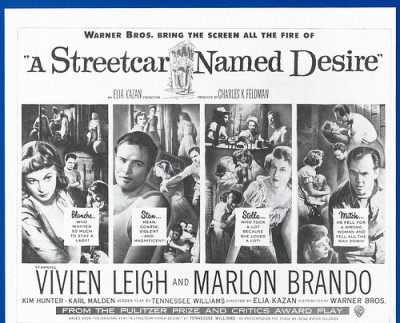
A Streetcar Named Desire is one of the most enduringly fresh, lively, and stimulating (and certainly one of the most intense, anomalous) films to emerge from the old Hollywood studio system, and its stature is justified anew as each subsequent viewing further reinforces the genius and passion at work both behind and in front of the camera; it's difficult to imagine anyone not being stirred and devastated by Streetcar's eternal, melancholy vigor. Blanche DuBois's ethereal, doomed self-delusion; Stanley Kowalski's irresistible rapaciousness; Stella's beyond-love-and-hate embracing of the sheer physicality of her and Stanley's relationship: these are vastly resonant emotions, feelings, desires -- and, in the hands of these amazing actors and under Kazan's superb direction, performances -- for the ages. Above and beyond the well-deserved classic status of the film itself, the superb technical standard that this Blu-ray release has brought it up to make it one of the easiest possible decisions for any movie aficionado to add to their collection; it's a purchase that's all pros, no cons, and requires no hesitation. Its visually ravishing excellence (as close to seeing a perfect, theatre-projected film on disc as I've ever experienced) will make you the Stella to its Stanley; you can toss your SD discs and burn your tapes, because this Streetcar will ruin you for any other. Highly Recommended.
|
| Popular Reviews |
| Sponsored Links |
|
|
| Sponsored Links |
|
|
| Release List | Reviews | Shop | Newsletter | Forum | DVD Giveaways | Blu-Ray | Advertise |
|
Copyright 2024 DVDTalk.com All Rights Reserved. Legal Info, Privacy Policy, Terms of Use,
Manage Preferences,
Your Privacy Choices | |||||||












